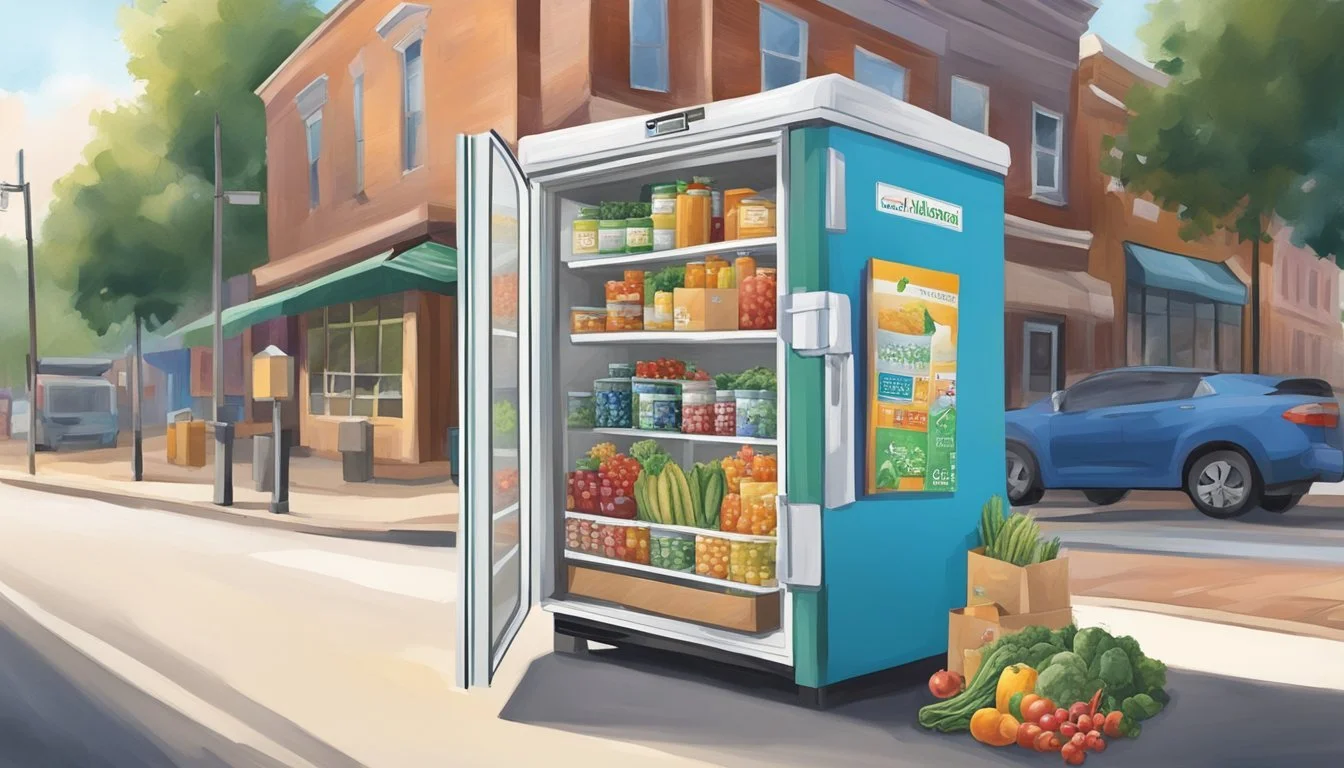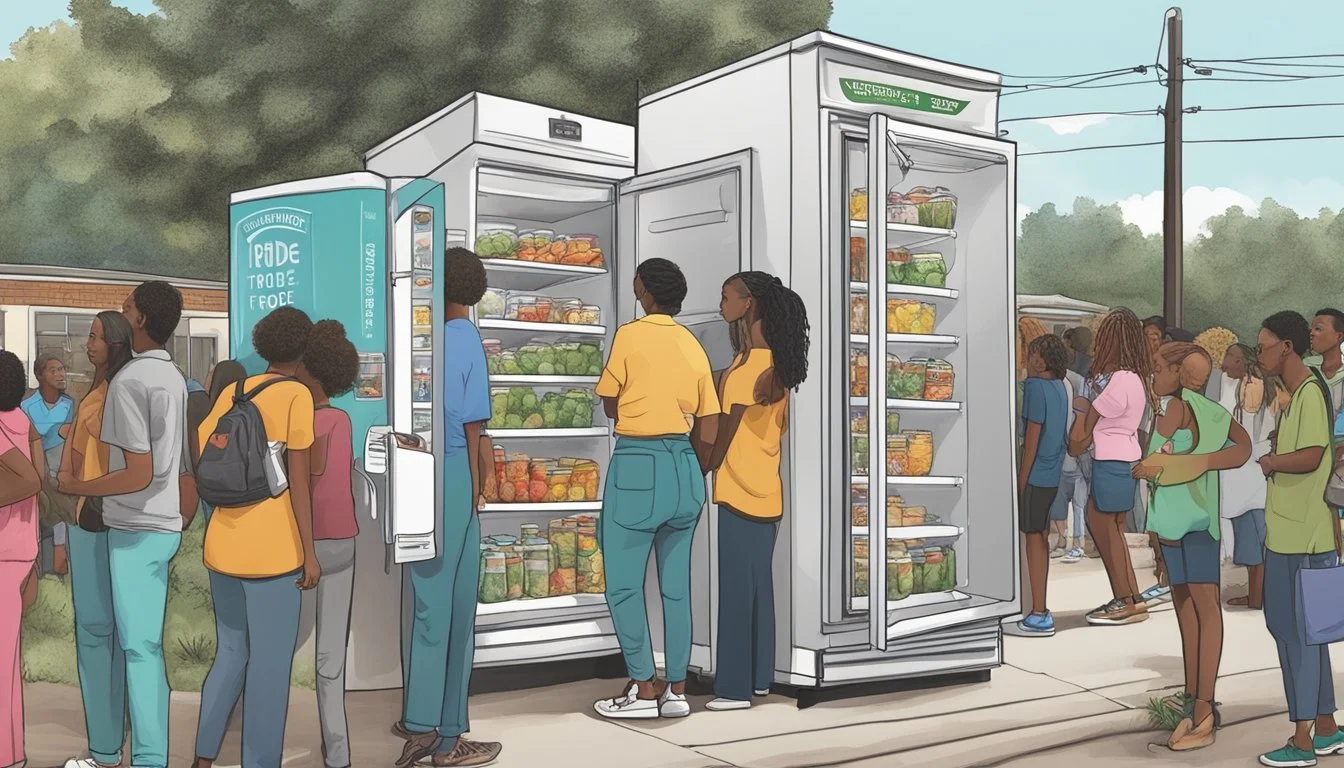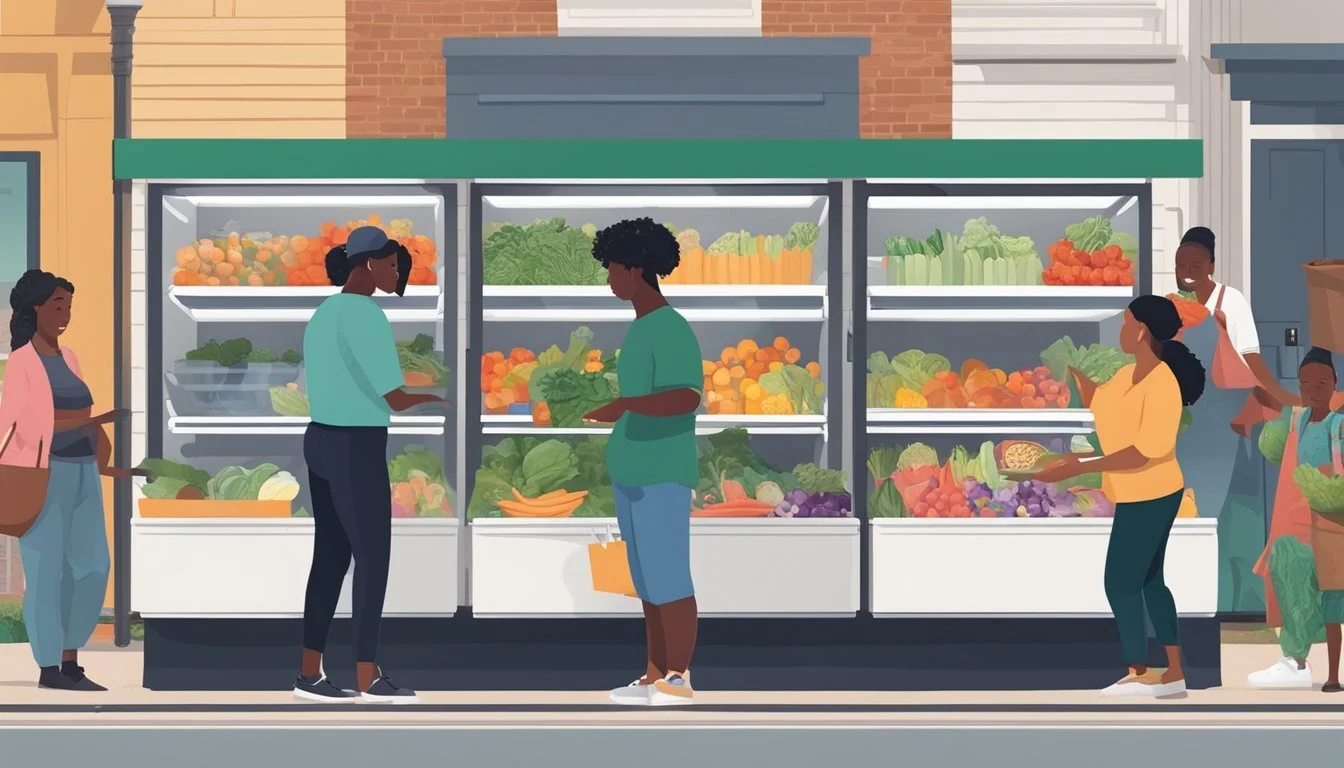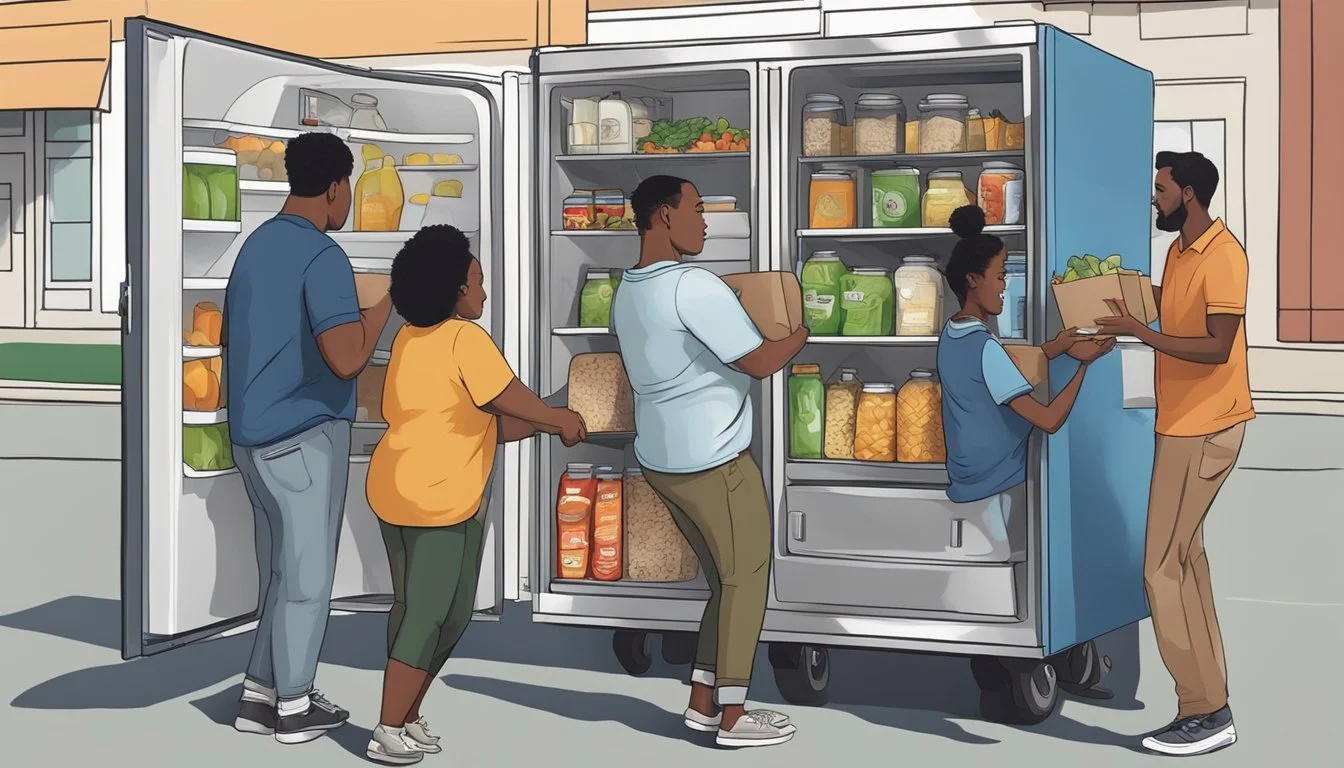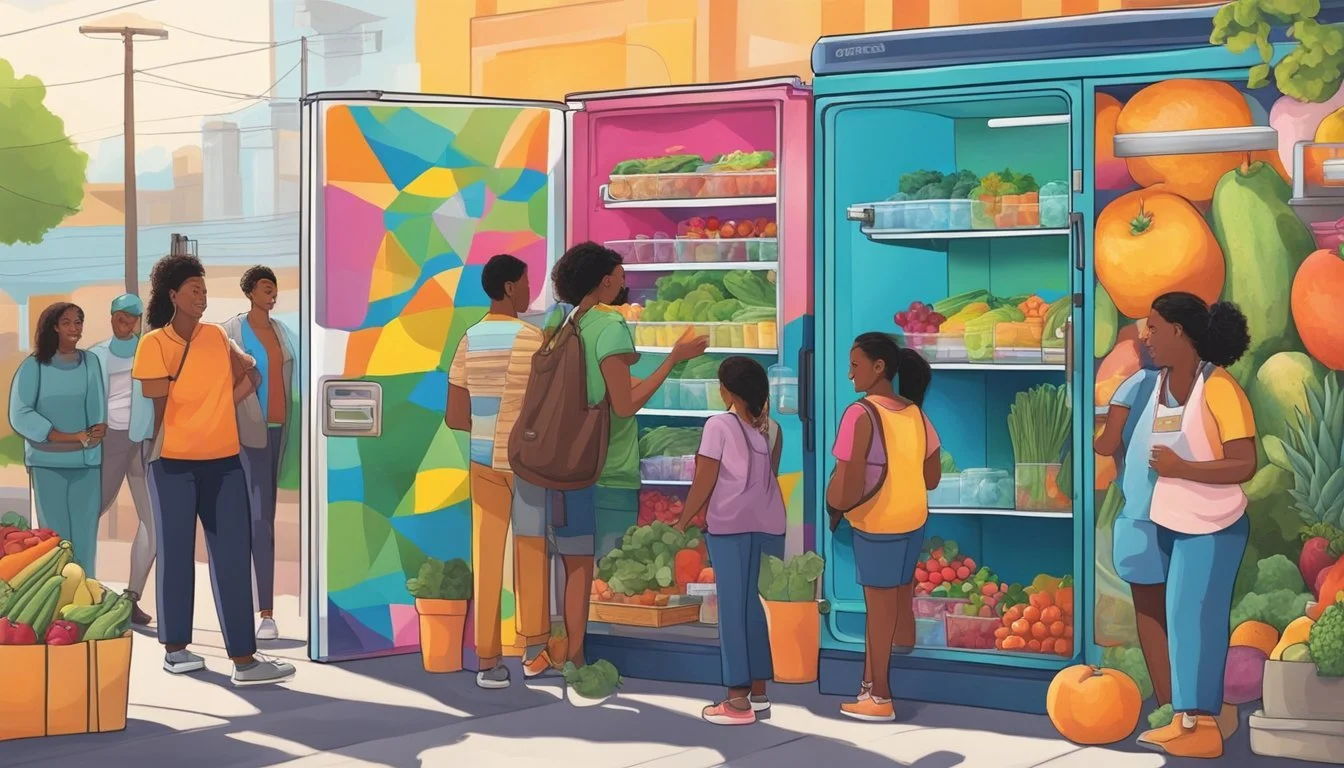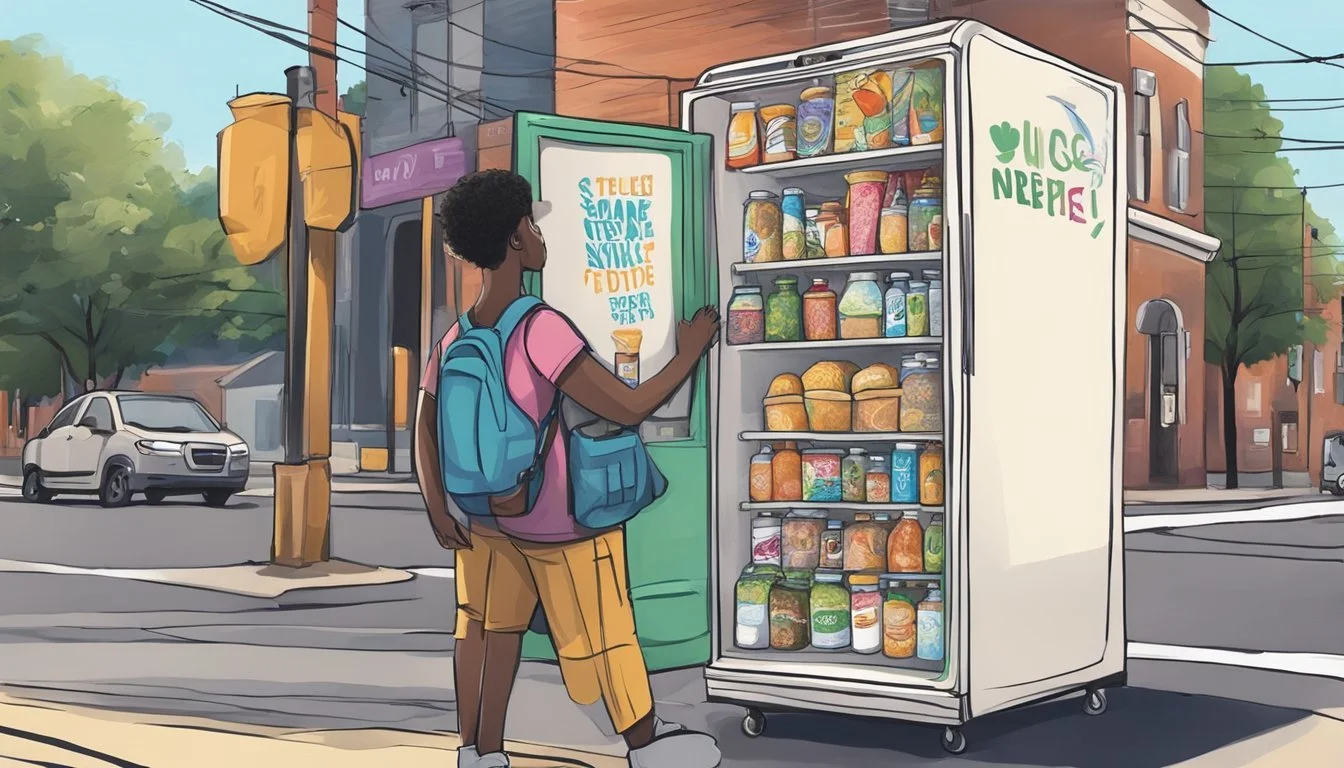Augusta, GA Community Fridge
Tackling Food Insecurity with Local Solidarity
In Augusta, GA, a new initiative has taken root in the form of the Community Fridge, a symbol of communal solidarity and support. Situated in a city known for its rich history and the famed Masters Golf Tournament, the Community Fridge offers a different kind of local attraction centered around compassion and addressing food insecurity. This public refrigerator and pantry is accessible to all residents, providing free food to anyone in need, no questions asked.
The concept of the Community Fridge in Augusta is straightforward yet profound: anyone can leave food, and anyone can take it. This project aims to tackle the pressing issue of hunger that affects a significant portion of the local population, while also reducing food waste. Volunteers and community organizations maintain the fridge, illustrating the community’s commitment to mutual aid and the well-being of its residents.
The presence of the Community Fridge in Augusta reflects a broader movement across the country where similar projects have emerged. It embodies a shift towards grassroots efforts to create a more food-secure future. In Augusta, the Community Fridge not only provides sustenance but also nurtures the communal spirit, reminding residents that even amid challenges, the city thrives on acts of kindness and community-driven solutions.
Background and Purpose
The establishment of a community fridge in Augusta, GA embodies a solution to food insecurity, harnessed through grassroots support and informed by an understanding of the benefits of food sharing.
Origins of Community Fridge Movement
The community fridge movement has proliferated as a response to global food insecurity, magnified during the pandemic. Grassroots organizations took the helm, establishing public refrigerators to enable food sharing. In Augusta, GA, the movement gains momentum from similar efforts, aligning with the ethos of reducing waste and providing accessible nutrition.
Food Insecurity In Augusta
In Augusta, food insecurity has become pressing, particularly in the shadows of economic challenges. The Grace Place Mission Center adopted a "blessing box," indicative of local strategies adopted to counter this. Community fridges serve as one facet of a broader approach to food justice in the area.
Mutual Aid and Grassroots Initiatives
Grassroots initiatives in Augusta, hinged on the principle of mutual aid, have sought to empower local populations. By establishing community fridges, organizations aim to create a self-sustaining method of support that transcends individual charity, fostering a sense of community resilience.
Psychology Behind Food Sharing
Community fridges do more than address food scarcity; they cultivate a psychology of sharing. They symbolize trust and collective responsibility, principles that rest at the core of community-based efforts to improve food justice and accessibility.
Operation and Management
The Augusta, GA Community Fridge operates with a well-coordinated effort among local volunteers, businesses, and nonprofits. This initiative ensures the consistent supply and safe distribution of fresh and non-perishable food items.
Volunteer Coordination
Volunteers are the backbone of the community fridge's operations. They are organized through a structured system that includes scheduling shifts for restocking and cleaning, as well as monitoring the fridge's inventory. A volunteer coordinator oversees this process, ensuring that the refrigerator is staffed with individuals who are knowledgeable about food safety and handling guidelines.
Shift management:
Restocking: Twice a day
Cleaning: Once a day
Inventory checks: Thrice a week
Business and Nonprofit Involvement
Local businesses and nonprofits play a crucial role in the sustainability of the community fridge. They establish partnerships that allow for the contribution of resources, including healthy food and financial support. These entities aim to reduce food waste by donating excess or near-expiry products that are still safe to consume.
Contributing entities:
Local grocers
Farms
Restaurants
Food banks
Sourcing of Food Supplies
The sourcing of food supplies is a meticulous process that focuses on the acquisition of fresh food as well as non-perishable food items. A dedicated team works with local businesses to ensure a steady influx of quality and varied food options, catering to the nutritional needs of the community while prioritizing the reduction of food waste.
Food sources:
Local supermarkets and farmer's markets for fresh produce
Restaurant overstock for ready-to-eat meals
Distributors for canned and dry goods
Maintenance and Safety Guidelines
Maintaining the refrigerator involves strict adherence to maintenance and safety guidelines to protect community members and ensure that food distributed is safe for consumption. The fridge is cleaned regularly, and the temperature is monitored to prevent spoilage. Food donations are checked for expiration and recall notices.
Safety protocols:
Regular temperature checks (min 3℃/37.4℉, max 4℃/39.2℉)
Sanitization of surfaces
Compliance with local health regulations
Impact and Challenges
The implementation of community fridges in Augusta, GA, has been met with a positive response, addressing food insecurity and food waste. However, challenges remain in scaling and ensuring the sustainability of this initiative.
Addressing Local Hunger
In Augusta, community fridges serve as a direct response to food insecurity issues. Residents have access to fresh food at no cost, alleviating the stress of providing daily meals. With 160 fridges across 28 states, this model has expanded significantly, indicating its effectiveness in meeting the immediate needs of the community.
Reducing Food Waste
The fridges not only offer aid to those in need but also contribute to the reduction of food waste. By redistributing surplus food that is still edible, these community fridges help ensure that less food ends up in landfills.
Community Engagement
Community engagement has been pivotal in the success of the fridges. Active participation and donations from residents enhance the sense of ownership and responsibility towards the project. This local involvement is crucial for the continued operation and maintenance of community fridges.
Scaling and Sustainability Issues
While the project has shown promise, scaling and sustainability issues pose a challenge. Long-term funding, consistent supply of food, and regular maintenance of the infrastructure are critical for future growth. Efforts must be made to secure resources and establish partnerships to address these concerns.
Locations and Accessibility
Community fridges provide free food to those in need and encourage food sharing within the community. The Augusta area has taken a noteworthy step in embracing this initiative.
Sites of Augusta Community Fridges
Augusta/CSRA HFH ReStore
Address: 3112 Washington Road, Augusta, GA 30907
Community fridges in Augusta can be found at accessible locations, such as nonprofit organization sites and local businesses. Organizations like Habitat for Humanity's ReStore in Augusta support community fridge programs and may serve as a model for local farmers to contribute surplus produce.
Access Times and Guidelines
Hours of Operation: 24/7, open access
Guidelines: Take what you need, leave what you can
Augusta's community fridges typically offer around-the-clock access, ensuring that individuals can source free food without restrictions of time. Users are urged to respect the provisions by taking food as per their need and contributing, if possible, to assist others.
Expansion Beyond Augusta
Atlanta's Initiative: Free99Fridge—an Atlanta-based community fridge project
The success of community fridges in Atlanta, with endeavors like Free99Fridge, provides a blueprint for possible expansion in nearby areas, including Augusta. The model demonstrates the potential for growth and how local farmers and communities can collaboratively tackle food insecurity.
Collaborations and Support
The Augusta, GA Community Fridge initiative thrives through robust collaborations and generous support from various entities. These partnerships are integral to ensuring a steady supply of fresh produce and essential funding.
Partnerships with Local Farmers
Local farmers play a pivotal role in the Community Fridge Network by providing fresh, nutritious produce to support community health. These partnerships often involve a mutual aid model, where farmers contribute surplus goods, reducing food waste while assisting those in need. It's a symbiotic relationship that signifies community resilience and sustainability.
Support from Local and Regional Businesses
Local and regional businesses bolster the Community Fridge initiative with vital resources and financial backing. This support ranges from refrigeration units donated by appliance vendors to financial contributions from businesses like Free99Fridge, a mutual aid initiative. These contributions ensure the sustained operation and expansion of the community fridge network, making it a reliable resource for residents.
Public Participation
The success of the Augusta, GA Community Fridge hinges on active public participation which involves a variety of roles for community members to support the initiative.
Contribution Opportunities
Individuals and local businesses have multiple ways to contribute to the community fridge project. They can donate fresh produce and healthy food items to ensure a consistent supply of free food. Donations are accepted at designated times and locations, ensuring that the fridge remains stocked for those in need.
Volunteer Efforts
Volunteers are the backbone of the community fridge program. They are responsible for the regular maintenance of the fridge, ensuring it is clean and well-organized. Volunteers also oversee the stocking of food, monitor the quality of items, and ensure that food safety standards are upheld.
Community Education and Outreach
Effective community education and outreach are vital for program sustainability. Initiatives include workshops on nutrition and food security, aimed at raising awareness of these issues in South Augusta. Additionally, they promote broad participation by informing the public about the existence of the community fridge and how to utilize or support it.
Future Directions
The ongoing evolution of the Augusta, GA community fridge initiative is poised to make significant strides through technological, policy, and network development.
Technological Enhancements
The community fridge network in Augusta plans to incorporate advanced refrigeration technology to improve energy efficiency and reduce carbon footprint. Intelligent systems may soon manage inventory levels, signaling when replenishment is needed. Additionally, they're exploring web-based platforms to coordinate donations and volunteer efforts more effectively.
Policy Implications
Policymakers are looking at the community fridge initiative as a model of mutual aid that could inform future legislation. By demonstrating how local action can address food insecurity, there's potential for policy to bolster these efforts, potentially providing government grants to sustain and expand the program.
Network Expansion Plans
Plans are underway to expand the network of community fridges throughout Augusta. These include identifying new locations with high need, and establishing partnerships with local businesses and organizations to secure support. The community fridge website serves as a central hub for information dissemination and volunteer coordination.
Efforts to grow the network aim to ensure that more residents have access to fresh food, embodying the spirit of mutual aid and community support that has been integral to the program's success.
Additional Resources
The "Additional Resources" section provides readers with in-depth materials and key contacts that can further their understanding of community fridges in Augusta, GA. This information includes external publications and relevant contact details for local programs.
External Articles and Studies
"Community Fridges Near Me": This article discusses the prevalence of community fridges and offers insights on how to find them, emphasizing the importance of local initiatives in addressing food insecurity.
"Share good food that would otherwise go to waste. - ChangeX": Readers can find data on the impact of community fridges, including waste reduction and savings to the community.
Contact Information for Local Initiatives
United Way of the CSRA
Address: Augusta GA 30904
Phone: 706-826-1495
Website: United Way of the CSRA
The Love Fridge (Example from another city)
Note: Although based in Chicago, The Love Fridge can offer guidance on running similar initiatives in Augusta.
Website: The Love Fridge
Local Stories
The Community Fridge Program in Augusta, GA has become a beacon of hope for many residents, addressing food insecurity and fostering community spirit. These local stories underscore the program's tangible impact on individuals and the area at large.
Testimonials from Augusta Residents
Jane Doe, a single mother of three, says, "The fridge is more than food; it's about knowing someone cares."
John Smith, a veteran, expresses his relief: "I can find fresh produce here when my pension falls short."
Success Stories of the Community Fridge Program
In South Augusta, the implementation of community fridges has increased access to healthy food options, notably improving the dietary habits of the local residents.
A recent festive food giveaway held by Golden Harvest Food Bank saw the participation of community leaders, highlighting the program's role in bringing together different sectors of society to combat hunger.

